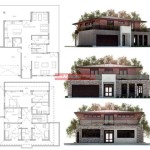Essential Aspects of House Extension Planning Rules
Planning rules for house extensions may vary depending on your location and the specific circumstances of your project. However, there are certain essential aspects that apply to all construction projects, ensuring proper planning and execution.
Permitted Development Rights
Before embarking on any major extension work, it's crucial to determine if your project falls within the scope of permitted development rights. These rights allow for certain types of extensions and alterations without requiring full planning permission. In most cases, extensions to the side and rear of your property are covered by permitted development rights, up to specified height and size limits.
Planning Permission
Projects that exceed permitted development rights require planning permission from the local authority. To obtain planning permission, you'll need to submit a detailed application outlining the proposed extension, including drawings, site plans, and a statement of case. The local planning authority will assess your application based on various factors, such as the impact on the character of the area, neighbors' views, and compliance with building regulations.
Building Regulations
In addition to planning permission, your extension must also comply with Building Regulations, which ensure the safety and habitability of the structure. These regulations cover aspects such as structural stability, energy efficiency, fire safety, and ventilation. You must employ a qualified building inspector to certify that your extension meets all relevant Building Regulations.
Neighbors' Concerns
It's important to be mindful of your neighbors and their potential concerns about your extension. They may have reservations about noise, loss of privacy, or a reduction in natural light. Communicate with your neighbors early in the planning process to address any concerns and minimize potential conflicts.
Professional Advice
For complex extension projects, it's advisable to seek professional advice from an architect or planning consultant. They can guide you through the planning process, ensure compliance with regulations, and provide valuable design and construction input.
Timeline and Costs
House extensions can take several months to complete, depending on the size and complexity of the project. The cost will vary depending on factors such as materials, labor, and professional fees. It's essential to set a realistic budget and timeline before commencing any work.
Other Considerations
In addition to the above essential aspects, there are other factors to consider when planning a house extension. These include:
- Boundary lines: Ensure that your proposed extension does not encroach on neighboring property.
- Access and services: Provide adequate access to the extension, including sufficient space for windows, doors, and utility connections.
- Impact on the environment: Consider the environmental impact of your extension, such as energy consumption and waste disposal.
- Future plans: If you anticipate making further extensions in the future, plan your current project accordingly to avoid potential complications.
By carefully considering these essential aspects, you can increase the likelihood of obtaining planning permission and ensuring a successful house extension project.

Do You Need Planning Permission For An Extension 2024

Do You Need Planning Permission For An Extension 2024

Homeowners Allowed To Do House Extensions Without Planning Permission Under New Rules Daily Mail

First Floor Two Y Extensions Do I Need Planning Permission

Q A How Will It Affect Families Planning An Extension

Planning Rules On Extensions To Be Relaxed Boost Economy Small House Extension Design
The 45 Degree Code What It Means For You Lapworth Architects Birmingham
House Extensions Design Guide

All You Need To Know About House Extensions In 2024

Frequently Asked Questions For Our Services








